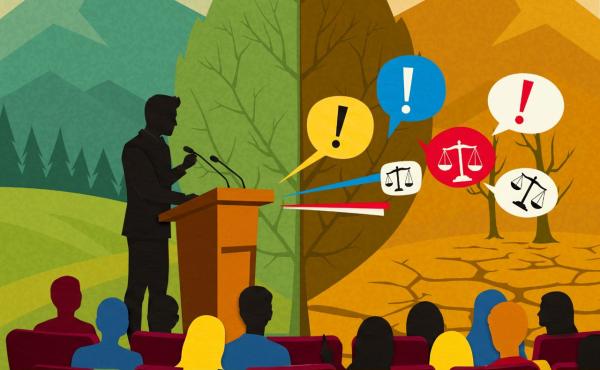
The ECGI blog is kindly supported by

How Directors' Past Experiences Shape Corporate Climate Policies
The interplay between individual experiences and corporate decision-making has long been a subject of academic inquiry. Our paper, "Climate Boards: Do Natural Disaster Experiences Make Directors More Prosocial?", delves into this relationship within the critical context of corporate climate policy.
We investigate whether the past experiences of corporate directors with abnormally devastating natural disasters influence firms' environmental stewardship, specifically their greenhouse gas emissions and the adoption of formal climate policies. Our findings suggest that directors who had experienced salient climatic disasters in the past are significantly more likely to be affiliated with nonprofit organizations, consistent with heightened prosocial preferences. Moreover, firms with more of these types directors exhibit lower greenhouse gas (GHG) emission intensities and are more likely to implement robust climate policies. This research contributes significantly to our understanding of the drivers behind corporate sustainability initiatives, highlighting the role of personal, formative experiences in shaping prosocial preferences that permeate the boardroom.
Our study's central premise is that salient and adverse past experiences, such as witnessing the destruction and suffering caused by major natural disasters, can mold individuals' prosocial preferences. Corporate directors who have such "Abnormal Disaster Experiences" (DADEs) may develop a stronger desire to mitigate the likelihood of future catastrophic events, including those exacerbated by climate change. Consequently, these directors might leverage their influence to push the firms they govern towards more environmentally responsible practices, primarily for societal benefit. We contrast this "prosocial preference" hypothesis with an alternative "climate risk belief" hypothesis, which posits that disaster experiences might lead directors to update their beliefs about financially material climate risks.
To test these hypotheses, we construct a comprehensive dataset linking directors' past employment locations with county-level natural disaster data from the Spatial Hazard Events and Loss Database for the United States (SHELDUS). We identify abnormal disasters as climate-related events causing property and crop damage exceeding $1 billion in 2022 dollars. This historical disaster exposure was then matched with the current board composition of publicly listed U.S. firms. Our analysis examines the relationship between the number and roles of DADEs on a board and various measures of corporate climate policy, including scope 1 and 2 GHG emission intensities and explicit climate policies (disclosed in the Climate Disclosure Project (CDP)) such as board oversight of climate issues, emission reduction targets, and managerial climate incentives.
The core findings reveal a statistically and economically significant negative association between the presence of DADEs on a board and the firm's scope 1 and 2 GHG emission intensities. For instance, an increase of one DADE per ten directors is associated with a 3% reduction in GHG emission intensity. Furthermore, firms with more DADEs are significantly more likely to assign climate policy responsibilities to the board, set explicit emission targets, and provide climate-related incentives to management.
Crucially, our study investigates the mechanisms through which DADEs exert their influence. We find that the impact on GHG emissions is primarily driven by DADEs who serve on governance, audit, or ESG/sustainability committees. In contrast, DADEs on compensation, finance, or risk committees do not exhibit such a strong effect on firm emissions. This distinction provides compelling evidence for the prosocial preference channel, suggesting that directors are more likely to channel their disaster-informed values through committees with broader stakeholder-oriented objectives rather than those focused solely on financial risk and performance. Moreover, the results indicate that male DADEs are the primary drivers of these effects, a finding that contrasts with other research suggesting female directors are quicker to update climate beliefs. Our study also highlights that independent directors with disaster experience are more influential in reducing emissions than non-independent directors, mitigating concerns about managerial influence.
Further bolstering the prosocial preference interpretation, our research demonstrates that the accumulation of disaster experiences over directors' careers is far more impactful than recent experiences. Directors with a longer history of exposure to abnormal disasters have a significantly greater effect on reducing firm emissions. Additionally, the effects are concentrated among emission-intensive and larger firms, suggesting that DADEs are targeting their influence where it can have the most significant societal benefit. Our study also finds that the results are driven by abnormally devastating disasters exceeding $1 billion in damages, and not by smaller, less salient events. Importantly, the impact of DADEs on corporate emissions does not appear to be merely a response to increasing societal attention to climate change, as the effects did not significantly strengthen after the 2015 Paris Agreement and the formation of the TCFD.
Finally, and perhaps most reassuringly for shareholders, we find no evidence that having more DADEs on the board improves or hurts firm financial performance. This suggests that directors with past disaster experiences are not pursuing emissions reductions at the expense of shareholder value, but rather seeking to balance financial and prosocial objectives.
In conclusion, our research provides robust evidence that the lived experiences of corporate directors, specifically exposure to abnormally devastating natural disasters, shape their prosocial preferences and subsequently influence corporate climate policy. Our findings underscore the enduring impact of formative experiences on individual values and their translation into corporate governance, offering valuable insights for understanding the motivations behind corporate sustainability initiatives and the composition of effective boards in an era of increasing climate concern.
_______________
By Sehoon Kim (University of Florida), Bernadette A. Minton (The Ohio State University), Rohan Williamson (Georgetown University, NBER, and ECGI)
The ECGI does not, consistent with its constitutional purpose, have a view or opinion. If you wish to respond to this article, you can submit a blog article or 'letter to the editor' by clicking here.



